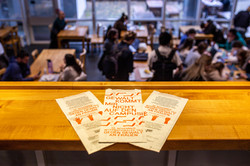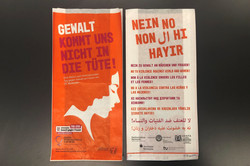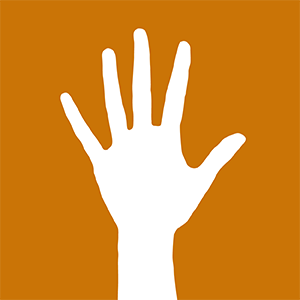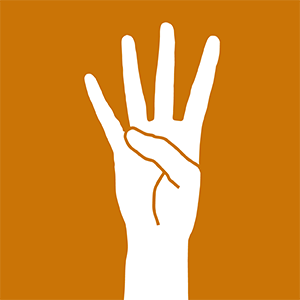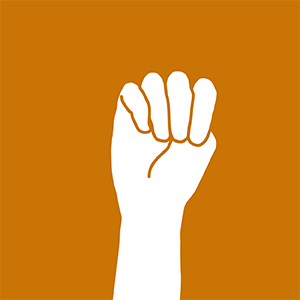International Day for the Elimination of Violence Against Women
Since 1999, the United Nations has been calling for the International Day of Action for the Elimination of Violence against Women on November 25.
Violence is one of the greatest health risks for women, according to the World Health Organisation (WHO). It is the main cause of death or health impairment for women between the ages of 16 and 44, ahead of cancer and traffic accidents (Frauen helfen Frauen, 2020).
According to current statistics from the BKA, a total of 360 girls and women were victims of murder in 2023, meaning that a femicide occurred almost every day in Germany. The number of female victims of attempted and completed homicides in 2023 was 938 (BKA, 2024).
Femicide is defined as the killing of a girl or woman because of their gender or because of certain ideas of femininity (BFF, 2020).
Women in relationships are particularly at risk. According to statistics from the Federal Criminal Police Office, almost 80 per cent of people affected by intimate partner violence in 2023 were female. At 80.6 per cent, women are also the majority of victims killed in connection with partner violence (BKA, 2024). In both 2020 and 2021, over 110,000 women experienced violence at the hands of their partner or ex-partner (BKA, 2023).
The federal report ‘Gender-specific crimes against women 2023’ clearly shows that violence against women is on the rise.
A woman or girl experienced domestic violence every three minutes and the number of female victims of sexual offences was 52,330 (BKA, 2024).
The most common forms of violence against women are deliberate assault, followed by threats, stalking, coercion and even dangerous bodily harm (bpb, 2020). Girls and women are also particularly affected by digital violence and human trafficking (BKA, 2024).
The Mirabal sisters
The origin of the International Day against Violence against Women and Girls is the abduction and killing of the three sisters Patria, Minerva and Maria Teresa Mirabal. Together with others, the three women rebelled against the dictatorship in the Dominican Republic in 1960. After the uprising failed, all the rebels were imprisoned. While the three women were soon released, their husbands remained in prison. When the sisters tried to visit them in prison on 25 November 1960, the women were strangled to death (Pruitt, 2021).
Since 1981, the sisters have been commemorated on the day of their deaths; since 1999, the United Nations has officially called for an international day of action on 25 November (Aktion Deutschland Hilft, 2021). In a 1994 UN Declaration on the Elimination of Violence against Women, violence against women was defined and recognised as gender-based violence for the first time (UN, 1994).
Protection against violence against women
In Germany, Section 177 of the German Criminal Code (StGB) states that anyone who performs sexual acts on another person against their recognisable will or has them perform sexual acts on that person or causes that person to perform or tolerate sexual acts on or by a third party is guilty of sexual assault or rape (Criminal Code Section 177 (1)). The principle ‘No means no’ has been enshrined in law since 2016 (bpb, 2020).
The Council of Europe Convention on preventing and combating violence against women and domestic violence (‘Istanbul Convention’) was an important step for the protection of women in 2011 (ibid.). In 2019, the International Labour Organization (ILO) supplemented the ILO Convention against Violence in the Workplace (DGB, 2019).
The 2024 published report also aims to further strengthen the protection of girls and women from gender-based violence.
Activities in Dortmund
On 25 November this year, Dortmund will once again be raising awareness of violence against women, creating public awareness and setting an example against violence. Numerous companies and organisations are taking part in the ‘Orange the World’ campaign. Buildings are illuminated in orange or orange flags are hoisted to take a stand against violence against women and girls. Orange flags will also be flying on campus on 25 November.
Together with the Studierendenwerk and the University of Applied Sciences and Arts Dortmund and Südwestfalen, TU Dortmund University is once again organising the campaign ‘Gewalt kommt uns nicht in die Tüte’ in November. All canteens and cafeterias are handing out sandwich bags with a picture of the ‘silent call for help’. Victims of violence can use this hand sign to seek help inconspicuously.
In the city of Dortmund, cafés, bakeries, the subscription box and the food bank pack their baked goods in sandwich bags, which are also intended to raise awareness of the International Day against Violence against Women and Girls. TU Dortmund University is also part of the campaign alliance (in German) here.
Events in Dortmund and online events:
On 25 November 2024, Dortmund women's associations will gather at Reinoldikirche from 4.30 pm to call on the public and politicians to take action with a statement campaign (in German).
Silent Signal for Help
With this hand signal, threatened persons can make themselves known to others discreetly and ask for help. To do this, with the hand raised, the thumb is placed inside over the palm, and visibly enclosed with the fingers to form a fist. In order for affected people to get help, it is important to spread the knowledge about the hand signal.
Help and support
Those affected can contact the Central Advice Centre for Protection against Discrimination and Sexualized Violence (SchuDS). Counseling is open to all members and guests of TU Dortmund University. It is confidential and can also take place anonymously. A consultation in English is possible.
The "Violence against women" helpline is a nationwide advice service for women who have experienced or are still experiencing violence. Counselors support victims of all nationalities, with and without disabilities, by telephone and online - 365 days a year, around the clock. Relatives, friends and professionals can also seek advice anonymously and free of charge.
Tel: 116016
Women's counseling center Dortmund
Märkische Straße 212-218
44141 Dortmund
Tel: 0231/521008
Women's shelter Dortmund
Tel: 0231/800081
E-Mail: frauenfrauenhaus-dortmundde
Women's counseling center Witten
Augustastrasse 47
58425 Witten
Tel: 02302/52596
E-Mail: infofrauenberatung-ende
Wildwasser Bochum e. V.
Tel: (0234) 79 45 652
Women's counseling center Gelsenkirchen
Robert-Koch-Str. 18
45879 Gelsenkirchen
Tel: 0209/36163691 und 0209/36163692
Last Updated: 11/22/2024
Sources (mainly in German)
Aktion Deutschland Hilft (2021): "Internationaler Tag zur Beseitigung von Gewalt gegen Frauen". Aktion-deutschland-hilft.de. Last seen: 23.08.2023.
Bundesinnenministerium (BMI, 2024). „Gewalt gegen Frauen“. Bmi.bund.de. Last seen: 31.10.2024.
Bundesverband der Frauenberatungsstellen (BFF, 2020): "Tötung von Frauen". Frauen-gegen-gewalt.de. Last seen: 23.08.2023.
Bundeskriminalamt (BKA, 2024), „Straftaten gegen Frauen und Mädchen steigen in allen Bereichen – Fast jeden Tag ein Femizid in Deutschland“. Bka.de. Letzter Zugriff: 20.11.2024.
Bundeskriminalamt (BKA, 2023). „Partnerschaftsgewalt – Kriminalstatistische Auswertung“. Bka.de. Letzter Zugriff: 31.10.2024.
Bundeszentrale für politische Bildung (bpb, 2020): "Internationaler Tag zur Beseitigung von Gewalt gegen Frauen". Bpb.de. Last seen: 23.08.2023.
Deutscher Gewerkschaftsbund (DGB, 2019): "ILO-Übereinkommen gegen Gewalt und sexuelle Belästigung am Arbeitsplatz beschlossen". Frauen.dgb.de. Last seen: 23.08.2023.
Frauen helfen Frauen e. V. (2020): "Gewalt gegen Frauen". Frauenhaus-dortmund.de. Last seen: 23.08.2023.
Strafgesetzbuch § 177 (1): "Strafgesetzbuch (StGB). §177 Sexueller Übergriff; sexuelle Nötigung; Vergewaltigung". Gesetze-im-internet.de. Last seen: 23.08.2023.
Pruitt, Sarah (2021): "How the Mirabal Sisters Helped Topple a Dictator." History.com. Last seen: 23.08.2023.
United Nations (UN, 1994): "Declaration on the Elimination of Violence against Woman". Last seen: 11.11.2024.





